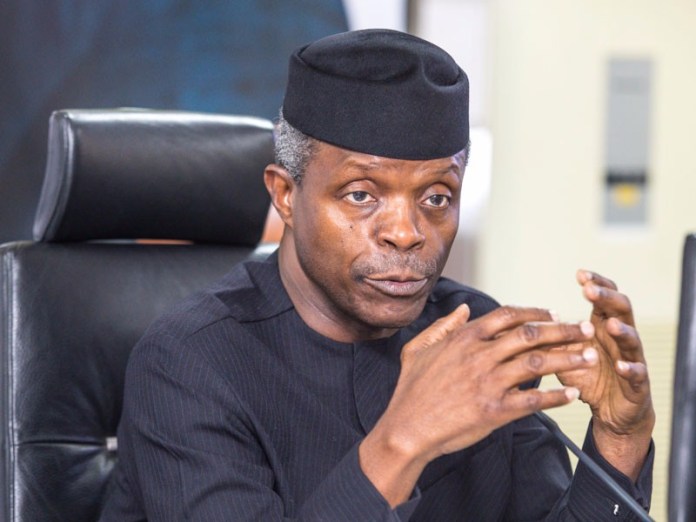- We’ve Paid 62 Contractors N50bn this Year – Osinbajo
Vice President Yemi Osinbajo on Thursday announced that since the beginning of this year, the Federal Government had paid about N50bn to 62 contractors working on 169 road projects across the country.
He also stated that the massive spending by the Federal Government in the construction sector was one key factor that recently dragged the country out of recession.
Osinbajo spoke as the special guest of honour at the 27th Biennial Conference of the Nigerian Institute of Quantity Surveyors in Abuja, which had the theme, ‘Developing the Economy for Sustainable Growth: The Construction Industry as an Effective Stimulant’.
The vice president stated that through the Ministry of Power, Works and Housing, the government was able to put in place a programme for the restoration of the nation’s road network and spent hundreds of billions constructing new roads and rehabilitating hitherto dilapidated and abandoned ones.
Osinbajo, who’s speech was read at the event by the Minister of State for Power, Works and Housing, Suleiman Hassan, said, “As a result of our increased spending in these areas, the massive debts owed to contractors are being settled, workers that were laid off are being recalled and the construction sites that were closed are being re-opened.
“We have it on record that payments made to 103 construction companies executing 192 projects during the implementation of the 2016 budget resulted in the employment of 17,749 people directly and 52,000 people indirectly in works. And so far this year, nearly N50bn has been paid to 62 contractors working on 149 projects to continue work on roads and bridges, and keep people at work.”
The vice president stated that economic development and the improvement of infrastructure were prominent components of the current administration’s programme, adding that to achieve these, the government adopted the strategy of reversing the nation’s debilitating dependence on crude oil.
He said, “A few months into the life of this administration, it was vindicated by the plunge in global oil prices, which culminated in an economic recession. We have, however, surmounted this setback and succeeded in getting the economy out of recession and onto the path of sustainable growth through increased focus on other relevant but hitherto ignored sectors such as agriculture and solid minerals, manufacturing, transport, and by means of new fiscal and trade policies.
“However, one of the most effective strategies that the government employed to drag the economy out of the woods happens to be its massive spending in the construction sector. This administration understands very well the critical role the construction industry plays in a nation’s industrial and economic development.”
The President, NIQS, Mrs. Mercy Iyortyer, said the theme of the conference was carefully selected as part of the institute’s ongoing efforts in contributing its quota to support the developmental plans of the current administration.
“This contribution is in the area of sustainable economic growth by providing full understanding and underscoring the prominent role the construction industry plays in overall national economic development and growth, but particularly as it relates to its role in stimulating the economy,” she stated.

 Forex3 weeks ago
Forex3 weeks ago
 Naira3 weeks ago
Naira3 weeks ago
 Billionaire Watch2 weeks ago
Billionaire Watch2 weeks ago


 Naira3 weeks ago
Naira3 weeks ago




 Naira2 weeks ago
Naira2 weeks ago




 Naira1 week ago
Naira1 week ago




 Naira4 weeks ago
Naira4 weeks ago
 Banking Sector4 weeks ago
Banking Sector4 weeks ago
























